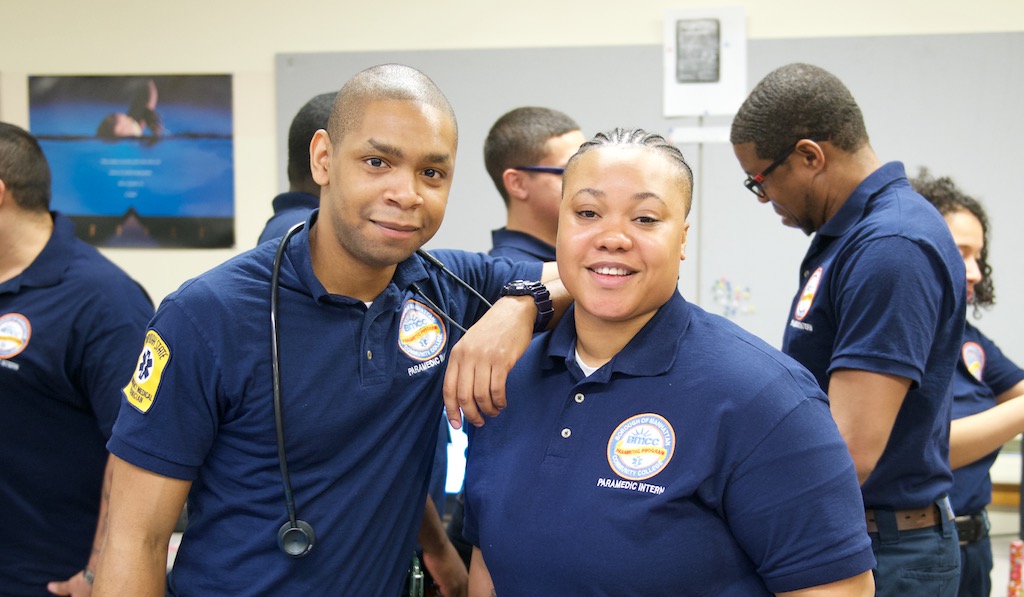
Alternative high school students who have earned their High School Equivalency diploma and are 18 to 24 years old can now enter a training program and start working toward a career as an Emergency Medical Technicians (EMT).
This opportunity has been made possible by a partnership between the Paramedic program in the Department of Allied Health Sciences and the Center for Continuing Education and Workforce Development at Borough of Manhattan Community College (BMCC/CUNY), Comprehensive Development, Inc. (CDI), and Northwell Health.
Funded by the Carroll and Milton Petrie Foundation, the Spring 2018 EMT pilot program is serving its first cohort, 25 students who will receive technical and customer service training and earn stackable credits into the Associate in Applied Sciences (A.A.S.) Paramedic program in BMCC’s Allied Health Science department. They will also complete an internship and be placed in EMT or related healthcare positions.
“This important partnership supports BMCC’s goal to enable student transitions across the education continuum from high school to our community college,” says Sunil Gupta, Dean of the Center for Continuing Education and Workforce Development at BMCC.
The EMT program enables eligible high school graduates to accrue postsecondary, bankable college credit, he explains. “It opens a pathway to higher education in the long run and in the immediate future, makes it possible for these 18- to 24-year-olds to apply in-demand skills and certification to enter the thriving New York City healthcare industry.”
Combining customer service and technical skills training
During the planning of the EMT program, “We changed our lens to ask, ‘What do employers want from workers in these fields?’,” says Michael A. Roberts, Executive Director of the CDI. “We met with medical providers and representatives from urgent care facilities and asked, ‘What would it take, for you to hire an 18- to 24-year-old? What do you see as missing in their skill set?’”
The upshot of those meetings is that the EMT students are starting with an eight-week Bridge Program taught by CDI staff at BMCC. During this time, they focus on workplace issues and customer service skills, especially as they relate to the healthcare industry.
After completing the Bridge Program, the students complete 12 weeks of EMT occupational training taught by BMCC’s Paramedic program, and an eight-week internship at a Northwell Health medical facility.
At the end of the program, they will be eligible to take the National Registry of Emergency Medical Technicians EMT Certification, and will work with an employment specialist whose goal is to place them in EMT or related positions.
“Collaboration between Northwell, Borough of Manhattan Community College and Comprehensive Development Inc. will help EMT program graduates develop all the competencies needed to succeed in the workplace and perform at a high level,” said Deirdre J. Duke, Corporate Director of Human Resources Programs at Northwell Health.
Serving the at-risk male population
Another consideration in designing the EMT program was who it will serve. Participants are recruited from three high schools in the CDI network: The High School for Health Professions and Human Services, Manhattan Comprehensive Night and Day High School, and City-As-School High School.
The EMT program is modeled after the successful Medical Assistant Specialist (MAS) program at BMCC, which also provides a Bridge Program, occupational training and an internship—all culminating in job placement and retention services.
While the MAS program has excellent completion rates, “It attracts about 85 percent female students, and we realized we weren’t serving the at-risk male population,” Roberts says. “Now we have an EMT cohort of 25 participants, and 18 of them are male participants within the 18- to 24-year-old age range.”
Applying EMT skills in tangible, life-saving settings
To complete the internship component of the EMT program, “We’re going to take the students to Northwell on the Long Island Rail Road,” says Roberts. “They’ll take part in an intensive training leading to their EMT certification exam and get a full immersion into the EMT workplace.”
Vincent Papasodero, Program Director at the Northwell Health Emergency Medical Institute (EMI), says, “Thanks to this innovative curriculum, EMI will be able to offer students tangible, life-saving skills through patient simulation sessions that replicate real-life medical emergencies, interactions with actual patients in clinical settings, including those with special needs, and training in hazardous materials and emergency vehicle operations.”
Removing the driver’s license barrier
As part of a larger emergency medical system, EMTs are expected to stabilize and safely transport patients in situations ranging from routine medical transports to life-threatening emergencies.
This translates into a barrier for the young men and women of color the EMT program is designed to serve, Roberts says, “most of whom live in urban centers, use public transportation and don’t drive.”
For this reason, the EMT program provides a driver’s training component.
“Not only that, it costs the students nothing,” Roberts says. “The program is free, and it’s an incredible opportunity. Graduates of the program who earn their certification could make up to $40,000 a year, as an EMT. They can also enter the Paramedic program at BMCC and lattice up, to become a paramedic. We’ve created a number of pathways for them.”
STORY HIGHLIGHTS
- Partnership between the Center for Continuing Education and Workforce Development at BMCC, Comprehensive Development, Inc. (CDI), and Northwell Health creates EMT training program
- Participants age 18 to 24 are recruited from alternative high schools in the CDI network
- They complete customer service and occupational trainings, do an internship and are placed in jobs as EMTs or in related healthcare roles

